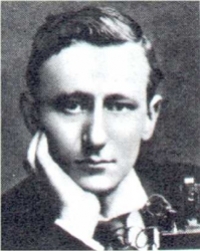Marconi, Guglielmo Marchese
Guglielmo Marchese Marconi (1874–1937), an Italian physicist widely recognized for his development of wireless telegraphy. Experimenting with a homemade apparatus at his father's country estate in Pontecchio, Italy in 1895, he sent long-wave signals over a distance of more than one mile. He patented his system, the first for wireless telegraphy, in England in 1896. In 1897, Marconi organized a company to develop commercial applications for wireless telegraphy and two years later, in 1899, he established wireless communication between France and England across the English Channel. In 1900, he took out his famous patent No. 7777 for “tuned” or “syntonic telegraphy.” On an historic day in December 1901, determined to prove that wireless waves were not affected by the curvature of the Earth, he used his system for transmitting the first wireless signals across the Atlantic between Poldhu, Cornwall, and St. John's, Newfoundland, a distance of 2,100 miles. Marconi received, jointly with K. F. Braun, the 1909 Nobel Prize in Physics for work in wireless telegraphy.
